Video game addiction is a new trap for suicide
Just minutes before falling to his death, a 14-year-old boy sent a message to his friends while he was sitting precariously on top of a six-story building in the suburb of Andheri in India’s commercial hub, Mumbai.
Aug 31, 2017

By Carlyle Laurie
Just minutes before falling to his death, a 14-year-old boy sent a message to his friends while he was sitting precariously on top of a six-story building in the suburb of Andheri in India’s commercial hub, Mumbai.
“Soon, the only thing you would be left with is a picture of me,” was his last social-media message. Then he jumped.
Why would an academically-sound teenager, with a strong extra-curricular record, commit suicide? Was it the result of video-game addiction, which experts say is increasing in India?
Mumbai police are probing whether an online suicide video game titled the Blue Whale Challenge — that has reportedly claimed the lives of more that 100 youths in Russia and is said to have spread to Britain — prompted the Mumbai boy to take his own life.
The online game, which originated in Russia, prompts participants to complete 50 insidious tasks, including watching horror movies, in 50 days. The pathetic last task is to commit suicide.
There have been reports that a day before his death plunge, the boy’s school friends circulated messages on social media about him undertaking the challenge.
Mumbai police are yet to ascertain a clear link between the video game and his suicide. However, the fact remains that video games of this nature are readily available online. The danger of this particular tragedy setting a precedent in India is real.
In the central Indian city of Indore, a sixth grader attempted to commit suicide by wanting to jump off a school terrace Aug 10, allegedly under the influence of the game. His classmates saved him after they found him precariously leaning over the railing.
V.P. Sharma, the police officer in-charge of the case, confirmed the incident and told ucanews.com that the boy was apparently in the 50th day of the challenge where administrators of the game had provoked him to jump from the building.
Bishop Chacko Thottumarickal of Indore said the “incident is an eye-opener” and schools in his diocese have urged students “to stay away from this dangerous game.”
Anand Kumar Sharma, founder of Service for Healthy use of Technology (SHUT) — the first of its kind in India — said video game addiction-related cases in the country had quadrupled during the past two years.
“We have four to five cases a week, relating to mostly 16 to 20-year-olds, brought to us by their parents,” he said.
Children and teens spent 10 to 14 hours a day playing video games, but many initially denied they had a problem.
“So we do not immediately take away the games from them,” Sharma said.
The first steps were to make a clinical assessment and obtain feedback.
Sharma said attempts were then made to motivate sufferers of the syndrome to make lifestyle changes such as sleeping, eating and communicating more.
Video game players should take regular breaks and strictly not use electronic devices for one hour before sleeping, he said.
The clinic that Sharma runs found that excessive playing led to a loss of interest in studies, decreased self-care, disturbance of biological functions and behavioural changes such as irritability when asked to stop accessing video games.
The video game industry has been booming world-wide. A report, published by the Confederation of Indian Industry and market research firm TechSci Research earlier this year, stated that the gaming industry in India is expected to bring in revenue of US$801 million by 2022, up from US$543.08 million in 2016, constituting annual growth of 6.61 percent.
Gone are the days of 64-bit media boxes providing popular games. Today, smartphone-powered app-driven games are readily accessible. The controllers of games such as the Blue Whale Challenge connect with each other through chat rooms. And they lure teenagers with specific interests via social media platforms, offering novelty and excitement.
“Once they start it, they cannot withdraw as the controllers collect their personal information and threaten them,” Sharma said.
(This article first appeared on ucanews.com the Website of National Catholic Reporter, and is being used with permission)







Total Comments:0